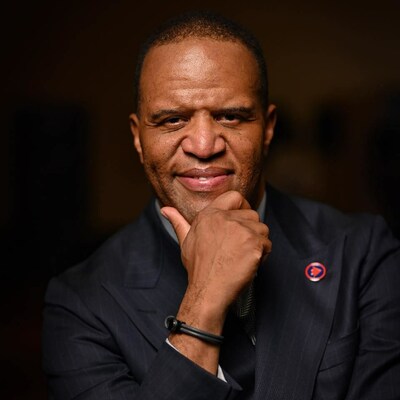SINGAPORE, March 18, 2025 /PRNewswire/ — John Hope Bryant, CEO of Operation HOPE, led a pivotal discussion on the future of work and the transformative impact of artificial intelligence (AI) at CNBC’s CONVERGE LIVE event in Singapore. CONVERGE LIVE is CNBC’s premier global forum that brings together top executives, policymakers, and thought leaders to discuss the most pressing issues shaping business and the economy. The event serves as a platform for high-level conversations on innovation, technology, and economic transformation.
The session, titled “The Future of Work in the Age of AI,” was moderated by CNBC’s Julia Boorstin and featured a distinguished panel including John Hope Bryant, Founder, Chairman & CEO of Operation HOPE; Elizabeth Hart, President of Leasing, North America, Newmark; and Peta Latimer, President of Mercer Asia. Together, they explored the profound implications of AI on employment and economic structures.
“We are not spending nearly enough time focusing on the bottom of the pyramid,” Bryant stated during the panel. “Convenience store jobs are gone, grocery store jobs are gone—this is not the future; this is right now.”
Bryant, a global advocate for financial literacy and economic empowerment, highlighted the disproportionate impact AI-driven job displacement will have on individuals with lower educational attainment and limited access to career development opportunities. He emphasized that governments and the private sector must take proactive steps to integrate AI education and workforce development programs, ensuring that economic progress does not leave the most vulnerable behind.
A Model for Inclusive Growth
Bryant pointed to Singapore as a case study in leveraging human capital as a national asset. “Singapore had a troubled past, yet its leaders invested in human capital when they had no natural resources,” he noted. “This approach transformed the country into an economic powerhouse. The U.S. and other nations must take similar steps to grow their economies by prioritizing workforce training.”
The panel explored how AI is reshaping industries, with businesses investing trillions in infrastructure, data centers, and automation. While AI adoption is accelerating, Bryant cautioned that without deliberate policies—such as tax incentives for apprenticeships, financial literacy education, and AI workforce training—income inequality could worsen, and social disruptions could escalate.
The Path Forward: AI with People, Not AI or People
In a forward-looking discussion, Bryant stressed that AI should be used to uplift workers rather than replace them. “It’s not AI or people; it’s AI with people,” he stated. “If we integrate AI with human capital investment, we can drive an economic boom.”
Bryant cited Operation HOPE’s own initiatives, including the AI LP3 – Artificial Intelligence Literacy Pipeline of Prosperity Project, which partners with educational institutions such as Georgia State University and Historically Black Colleges and Universities (HBCUs) to prepare students for AI-driven industries. “We need to pipeline young talent into AI careers, offering internships, apprenticeships, and training opportunities before job losses occur.”
Reimagining Economic Growth
With the U.S. national debt surpassing $36 trillion, Bryant advocated for expanding workforce participation as a means to stimulate GDP growth. “Instead of trying to cut our way out of debt, let’s grow the pie,” he said. “If we train and incentivize the bottom 10-20% of the economic pyramid, we could add 3-4% to GDP annually over the next decade.”
The discussion concluded with a call to action for business leaders and policymakers to embrace AI as a tool for economic inclusivity. “The greatest risk isn’t AI itself—it’s failing to prepare people for it,” Bryant remarked. “Countries that prioritize AI literacy, financial literacy, and economic mobility will be the ones that thrive in the coming decades.”
About Operation HOPE, Inc.
Since 1992, Operation HOPE has been moving America from civil rights to “Silver Rights” with the mission of making free enterprise and capitalism work for the underserved—disrupting poverty for millions of low and moderate-income youth and adults across the nation. Through its award-winning community uplift model, HOPE Inside, which received the Innovator of the Year recognition by American Banker magazine, Operation HOPE has served more than 4 million individuals and directed more than $4 billion in economic activity into disenfranchised communities—turning check-cashing customers into banking customers, renters into homeowners, small business dreamers into small business owners, minimum wage workers into living wage consumers, and uncertain disaster victims into financially empowered disaster survivors. Operation HOPE recently received Fast Company’s World Changing Ideas Award for driving entrepreneurship as well as its tenth consecutive 4-star charity rating for fiscal management and commitment to transparency and accountability from the prestigious non-profit evaluator, Charity Navigator. For more information: OperationHOPE.org. Join the HOPE conversation on Twitter, Facebook, Instagram and LinkedIn.
Contacts:
Kevin Boucher, Operation HOPE
kevin.boucher@operationhope.org
Lalohni (LA) Campbell, Per/Se Media Group
la@persemediagroup.com
404-593-7145
![]() View original content to download multimedia:https://www.prnewswire.com/news-releases/operation-hope-ceo-john-hope-bryant-leads-cnbc-executive-panel-on-ai-and-workforce-transformation-in-singapore-302403859.html
View original content to download multimedia:https://www.prnewswire.com/news-releases/operation-hope-ceo-john-hope-bryant-leads-cnbc-executive-panel-on-ai-and-workforce-transformation-in-singapore-302403859.html
SOURCE Operation HOPE, Inc.

Featured Image: DepositPhoto @ Haydmitriy

















